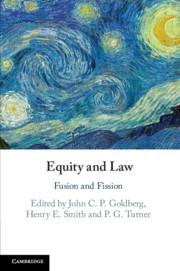Book contents
- Equity and Law
- Equity and Law
- Copyright page
- Contents
- Figures
- Table
- Contributors
- Acknowledgements
- Abbreviations
- Table of Cases
- Statutes
- 1 Fusion and Theories of Equity in Common Law Systems
- Part I Legal Systems and Legal Institutions
- Part II Fusion and Fission in Doctrine and Practice
- Part III Functional, Analytical and Theoretical Views
- 13 Wrongful Fusion
- 14 Avoiding Anarchy?
- 15 Equity and the Modern Mind
- 16 An Argument for Limited Fission
- 17 ‘Single Nature’s Double Name’
- Index
16 - An Argument for Limited Fission
from Part III - Functional, Analytical and Theoretical Views
Published online by Cambridge University Press: 26 July 2019
- Equity and Law
- Equity and Law
- Copyright page
- Contents
- Figures
- Table
- Contributors
- Acknowledgements
- Abbreviations
- Table of Cases
- Statutes
- 1 Fusion and Theories of Equity in Common Law Systems
- Part I Legal Systems and Legal Institutions
- Part II Fusion and Fission in Doctrine and Practice
- Part III Functional, Analytical and Theoretical Views
- 13 Wrongful Fusion
- 14 Avoiding Anarchy?
- 15 Equity and the Modern Mind
- 16 An Argument for Limited Fission
- 17 ‘Single Nature’s Double Name’
- Index
Summary
This chapter makes an argument for the limited fission of law and equity: a limited argument, that is, that equity should be seen and kept as a somewhat separate element of common law systems. The argument is expounded through the example of liability for breach of trust. English decisions have adopted a fused approach to relief for breach of trust which assimilates trusts to contracts. However, this assumes away the distinct normative concerns of equity, particularly the politically important value of autonomy which is expressed through the doctrines of accounting applicable to trustees. It is then shown that the argument has limits, since in charity law the influence of equity is contingently important: if it becomes unimportant, the argument for separately recognising equity there would lose validity.
Keywords
- Type
- Chapter
- Information
- Equity and LawFusion and Fission, pp. 374 - 393Publisher: Cambridge University PressPrint publication year: 2019

